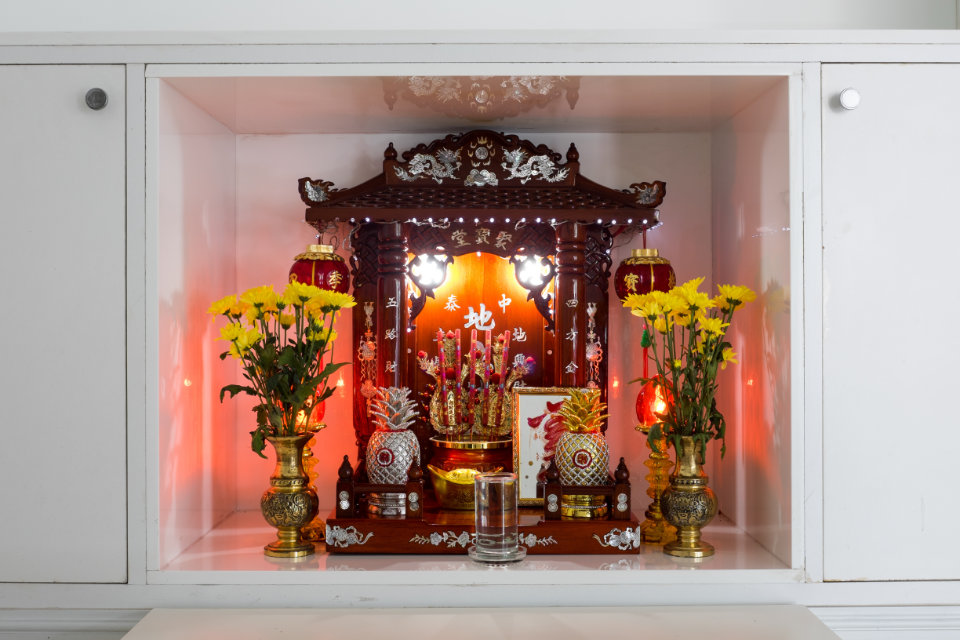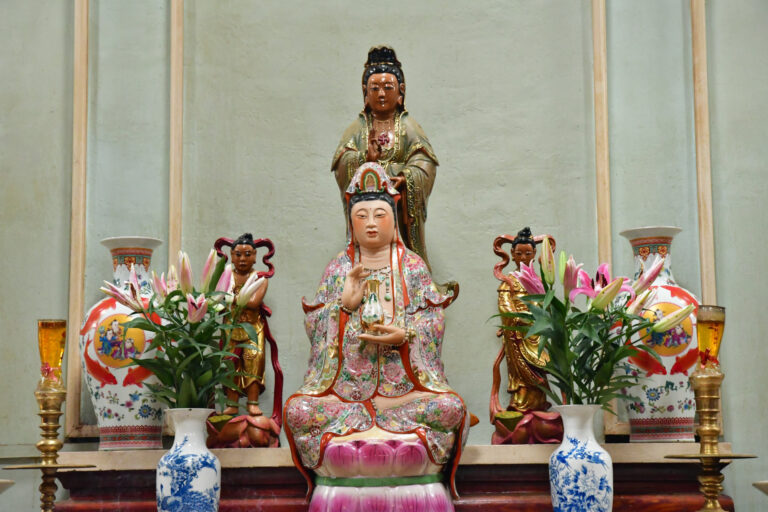In the auspicious 2024 Year of the Dragon, the ancient ritual of altar cleaning takes on profound significance, promising to infuse your sacred space with the mythical creature’s legendary strength and fortune.
This definitive guide presents the prime dates, dictated by the Chinese lunar calendar, to perform altar cleaning—transforming your spiritual practice into a conduit for the year’s abundant blessings.
Harness these moments of cosmic favor to elevate your environment, inviting balance, prosperity, and harmony into every corner of your life.
Table of Contents
Understanding the Lunar Calendar and Auspicious Dates
The Chinese lunar calendar, a cornerstone of traditional Chinese culture, is a lunisolar calendar that indicates both the moon phase and the time of the solar year. It is the fundamental guide for determining the dates of festivals and is deeply intertwined with Chinese astrology and feng shui.
In 2024, the calendar not only pinpoints the start of the new year but also outlines a series of auspicious dates for activities such as altar cleaning. These dates are meticulously chosen based on complex astrological calculations and are believed to bring the best energy for starting anew and clearing out the old.
In traditional Chinese almanac, also known as a Tung Shing or Farmer’s Almanac, each day is characterized by a specific term that indicates the suitability of performing various activities.
Here’s a basic explanation of some types of days commonly found in such almanacs:
- Jian (建日) – It is considered a good day to begin or inaugurate new projects. It’s associated with growth and development. Starting new ventures, opening businesses, or signing contracts are usually favored on Jian days.
- Man (满日) – This is a day that signifies fullness and is seen as positive for completing tasks, reaching agreements, and achieving goals. It is also considered good for gatherings and celebrations.
- Ding (定日) – Ding days are associated with stability and setting things in place. It is a favorable day for laying foundations—both in the literal sense and figuratively, like setting plans or making important decisions.
- Zhi (執日) – These days are suitable for enforcing or executing plans, following through on decisions, and taking action. Zhi days are for perseverance and focus on ongoing projects.
- Cheng (成日) – Cheng days are days of accomplishment and success. It is an auspicious day for concluding activities, finalizing deals, or celebrating achievements.
- Shou (收日) – Shou translates to “receiving” and is traditionally a good day for collecting debts, receiving payments, or gathering resources. It’s also seen as a good day for saving or conserving energy.
- Kai (开日) – Kai days are considered good for openings and launches. This can be a particularly good day for starting a business, hosting grand openings, or unveiling new projects.
- Wei (危日) – Wei days carry a sense of danger or instability. It is generally advised to be cautious on these days, avoiding risks or important new undertakings.
- Bi (闭日) – Bi days are seen as times to close or conclude. It’s not considered a good day for starting new things but can be suitable for ending, wrapping up, or turning inwards for reflection.
- Chu (除日) – Chu days are considered good for removing the old, cleansing, and getting rid of unwanted influences. It’s a day for decluttering, ending relationships, or quitting habits.
- Xiu (休日) – Xiu days suggest rest and are not favorable for active pursuits or starting new projects. These are considered good days for rest and recuperation.
- Wang (亡日) – On Wang days, it is advised to lay low and avoid significant beginnings or important transactions, as these days are associated with loss or lack of support.
- Da An (大安日) – Da An days are considered very auspicious, signifying great peace and stability. It’s a good day for major life events like weddings or starting a new job.
- Xiao An (小安日) – Xiao An days are less auspicious than Da An but still considered safe and stable, suitable for routine activities.
- Ping (平日) – Ping days are average, neutral days without significant positive or negative influences. They are suitable for everyday activities.
- Zeng (增日) – Zeng days are for growth and increase, good for investment, expansion, and accumulation.
- Ban (半日) – Ban days carry a sense of incompleteness and are not favorable for important activities that require completion or fullness.
Each type of day comes with its own set of beliefs about what activities are best performed on that day. It should be noted that these interpretations can vary between different regions and schools of thought within Chinese culture, and they are often used in conjunction with other aspects of Chinese metaphysics, such as the zodiac, five elements theory, and feng shui.
The Significance of Altar Cleaning
Similar to spring cleaning, altar cleaning is not just a physical act of dusting and organizing. It’s a spiritual reset, a ritual that invites positive energy into one’s home or temple. In many Chinese households, the altar is a sacred space dedicated to honoring deities, ancestors, or significant symbols.
By cleaning this space, one shows respect to the spiritual realm and opens up a channel for clearer communication with the divine.

How to Determine the Best Dates for Altar Cleaning
The calendar provided lists several auspicious dates for altar cleaning in the year 2024. Each date is carefully selected, aligning with specific energies of the day according to the Chinese almanac.
2024 Auspicious Dates For Altar Cleaning Chart
| Date | Lunar Date | Auspicious Timing | Day | Type of Day | Conflicting Zodiac |
|---|---|---|---|---|---|
| 05/02/2024 | 26 December 十二月廿六 | 07:00-08:59 11:00-12:59 13:00-14:59 19:00-20:59 | Mon | 收日 (Shou) | Snake |
| 06/02/2024 | 27 December 十二月廿七 | 05:00-06:59 11:00-12:59 15:00-16:59 17:00-18:59 | Tue | 开日 (Kai) | Horse |
| 08/02/2024 | 29 December 十二月廿九 | 07:00-08:59 09:00-10:59 13:00-14:59 19:00-20:59 | Thu | 建日 (Jian) | Monkey |
Performing Altar Cleaning for Chinese Deities and Ancestors
Those who have altars for worshipping deities and ancestors at home understand that the censer and deity statues on the altar should not be cleaned regularly. However, there is a specific period for altar cleaning – from the day after sending off the deities on the 24th of the 12th lunar month until just before the Chinese New Year.
This period is considered a significant annual cleaning in religious practice, commonly referred to as “Qing Tun” 清屯.
For families who worship deities and ancestors, it’s crucial to make the most of this time for a thorough altar cleaning. So, how should one properly conduct “Qing Tun” 清屯, and what are the important considerations?
8 Key Steps for “Qing Tun” 清屯:
- Sending Off the Deities: The deities must be sent off before 9 a.m. on the 24th day of the 12th lunar month. Prepare fruits and light incense to inform the deities and ancestors, stating your intention to conduct “Qing Tun” 清屯 and requesting them to temporarily step aside. Begin the cleaning once the incense has burned out.
- Separating the Deities and Ancestors: Arrange two tables, covered with red paper or clean cloth, and separate the deities and ancestors. If only one table is available, it can be used for both, with appropriate separation.
- Cleaning the Deity Statues: Use a small brush tied with a red string to clean the deity statues, particularly the golden bodies, but avoid brushing their faces. Do not wash their faces with water; instead, use a brand-new, clean cloth for this and for cleaning the table surface. Hold the censer firmly while cleaning to avoid disturbing it.
- Cleaning the Censer: The most critical step is cleaning the censer. Carefully spoon out the incense ash onto a newspaper. The censer should retain about 70% of its ash. Sift the removed ash using a fine sieve. Clean the sieve thoroughly before proceeding to clean the ancestors’ censer. After both censers are cleaned, place them aside and continue with the cleaning process.
For the deities’ censer, light seven “Joss Paper” strips, pass them around the censer, and then place the fire inside it, adding all the incense ash back.
This step, called “Xiao Chu Da Jin” 小出大进, involves stirring the ash with three incense sticks to loosen and level the surface, adhering to the saying, “Loose incense sticks make earning money easy. (插香松,赚钱就轻松)”
Finally, wipe the censer’s exterior with a clean cloth, keeping three incense sticks and burning the rest wrapped in red paper. - Cleaning Ancestral Tablets and Censer: Use a new brush or a brand-new clean cloth to clean the ancestral tablets. Similar to the deities’ censer, spoon out the ash from the ancestors’ censer and pour it back after sifting. Keep three incense sticks to symbolize the continuity of the lineage.
- Restoring the Positions: Return all deity statues and ancestral tablets to their original places, starting with the deities and then the ancestors. Ensure the statues are properly positioned, with the censer placed in front.
- Inviting the Deities and Ancestors Back: Once everything is arranged, burn three sticks of incense to invite the deities back and then burn joss paper to complete the ritual. Repeat the same process to welcome the ancestors back.
Additional Considerations During “Qing Tun” 清屯:
- Handling the Censer: When cleaning the censer, do not ‘pour out’ the ash as it is considered the ‘wealth treasury’ of the home. Instead, use a spoon to carefully remove the ash. This practice prevents financial loss.
- Lifting the Censer: When moving the censer, it’s customary to say ‘qi’ (起) as a sign of respect.
- Separation of Ashes: The ashes of the deities and ancestors should not be mixed, maintaining their distinct sanctity.
- Position and Height: The ancestral tablets should not be placed higher than the deities or exceed the height of the deity statues. If the statues are not tall enough, they can be elevated using incense paper with three dolls (三童子寿金) or a specialized stand available at Buddhist supply stores.
- Cleaning Colored Guanyin Statues: If you have a colored Guanyin statue that has been consecrated, avoid using cleaning agents. Wipe with warm water instead. If the statue has not been consecrated, it can be cleaned with regular cleaning agents.
- Purification Before Cleaning: Ensure personal cleanliness before arranging the deity altar. If not fully purified, at least wash your hands. This is to ensure the deities and ancestors comfortably bless the home throughout the year.
By incorporating these steps and considerations, you can respectfully and effectively conduct “Qing Tun” 清屯, ensuring a spiritually clean and harmonious environment for your deities and ancestors.
Happy Altar Cleaning
As we step into the Year of the Dragon, let’s embrace the traditions that have been passed down through generations. Altar cleaning is more than a task; it’s a spiritual practice that refreshes our surroundings and our souls.
On each of these auspicious dates for altar cleaning, we have the opportunity to renew our intentions, honor our heritage, and look forward to the promise of the new year.
May your altars shine brightly, and may the Year of the Dragon bring you joy, peace, and abundance.
Check out auspicious dates during Chinese New Year 2024 for other activities:
- Auspicious Dates for Gambling Luck
- Auspicious Days to Visiting
- Auspicious Dates for Returning to Work
- Auspicious Dates for Li Chun 2024
How often should I clean my deity statue on the altar?
In traditional Chinese practice, deity statues on altars are usually cleaned only during “Qing Tun” (清屯), the period from the day after the 24th of the 12th lunar month to just before Chinese New Year. This annual cleaning is a key religious practice, and regular disturbance of the deity statues outside this time is generally avoided to preserve respect and sanctity.
What should I use to clean the deity statue?
Use a soft, clean cloth to gently wipe the statue. If needed, a mild, non-abrasive cleaner can be used for thorough cleaning. Ensure the cleaner is appropriate for the material of the statue (e.g., brass, wood, stone) to avoid damage.
Should I perform any rituals before or after cleaning the deity statue?
Some traditions advocate for a small prayer or ritual before and after cleaning the statue. This is seen as a mark of respect and can vary based on individual religious practices.



